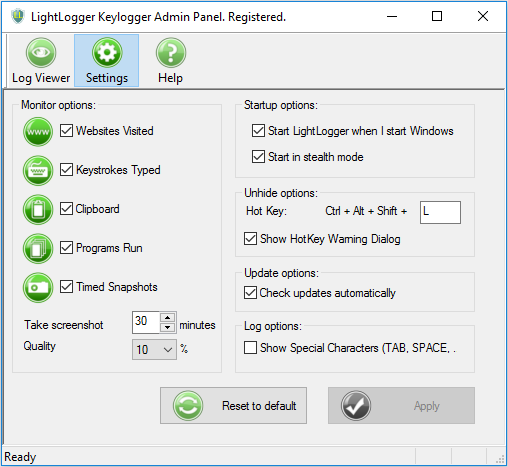-
How to Protect Your Child from Internet Sexting

- Graphic pornography, sexual predators, cyber bullies, sexting, addictive online gaming-all make the internet a dangerous place for children. No safeguard stands between the internet and your child except your involved, informed parenting. This article from LightLogger Keylogger presents effective, practical steps you can take to protect your child from one of those threats, internet sexting.
- Sexting is sending, exchanging, or posting on websites nude or sexually provocative images of oneself or others using either a cell phone or a computer connected to a web camera. In the US, one in five teens report having sent, received, or forwarded nude or sexually suggestive content. Further, in much of the US sexting of an image of a minor, even an image of the sender, is considered distribution of child pornography and is illegal.
- To protect your child from internet sexting, first implement a comprehensive internet protection plan. Use the free resources offered online at Internet Safety 101, including the written rules, software tools, youth pledge, and appropriate age-based guidelines for your child. Experts on internet safety recommend parents of children 18 and under establish clear, written rules for their kids’ online behavior and use software tools to filter and monitor their kids’ activity. Both the rules and tools should be appropriate to your child’s age. When installing software, include an activity monitor like LightLogger Keylogger, a website filter, and a child-safe browser for younger children.
- Now take these additional steps to protect your child:
- Graphic pornography, sexual predators, cyber bullies, sexting, addictive online gaming-all make the internet a dangerous place for children. No safeguard stands between the internet and your child except your involved, informed parenting. This article from LightLogger Keylogger presents effective, practical steps you can take to protect your child from one of those threats, internet sexting.
- Make sure your child understands the legal and personal dangers of sexting. Teach him or her that images sent electronically are rarely anonymous, can be forwarded to anyone anywhere, and can never be retrieved.
- Require that your child gets your permission before sending his or her picture or a family member’s picture to others using a computer or cell phone.
- Teach your child to delete any sexually suggestive images or messages he or she receives on his or her cell phone or computer.
- Keep your child’s internet-connected computer in an open area out of the child’s bedroom.
- Set strict rules for your child’s use of a web camera.
- Spot check your child’s online activity occasionally with your monitoring software. LightLogger Keylogger, an inexpensive, easy-to-use monitoring tool, is ideal for this purpose, since it records many types of activity and can take images periodically of your monitor’s content.
- Remember that being actively involved and interested in your child’s online life is the most important tool you have.
- Read all the articles on internet safety from HeavenWard.
- Remember that being actively involved and interested in your child’s online life is the most important tool you have.